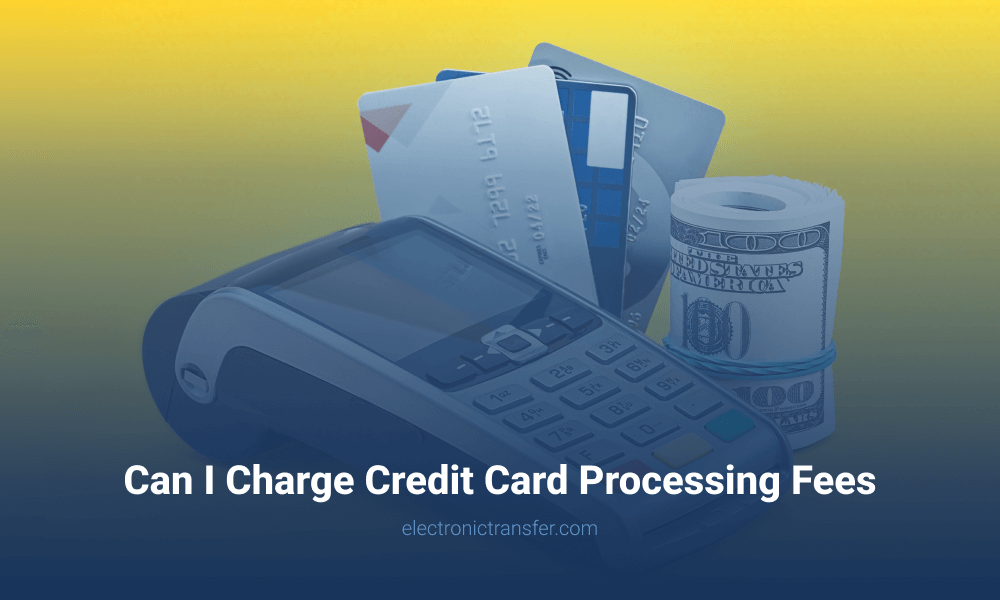Can I Charge Credit Card Processing Fees?

Using a credit card comes with its pros and cons. On the one hand, you can earn rewards through purchases at shops and the retailers of your choice.
But, on the other hand, merchants may add surcharges to your card or require minimum purchase requirements.
While some merchants engage in the practice, the real question is: can I charge a credit card processing fee? Let’s find out.
Types of Credit Card Processing Charges
First off, you need to understand the three types of charges associated with credit card processing:
- Convenience fees
- Surcharges
- Minimum purchase requirements
It is important to understand what each of these fees might cost you. Let’s do just that.
What Is a Convenience Fee?
Merchants charge a convenience fee when the consumer pays with a form of electronic payment, like a credit card. Sellers consider this payment form different from standard alternatives like cash, check, and Automated Clearing House transfer (ACH).
Convenience fees range between a fixed dollar amount to a specific percentage of the transaction amount. Rates can vary between two and three percent of the total transaction, depending on the credit card network.
MasterCard, for instance, has rules that only official government agencies and certain companies can charge convenience fees.
Visa, on the other hand, states that merchants can add flat convenience fees on any nonstandard payment method.
Payments where convenience fees are most standard are property tax payments, mortgage payments, taxes, and college tuition. Merchants must disclose these fees to consumers before accepting the form of payment.
What Are Surcharges?
Credit card surcharges are optional fees. Whenever a customer pays with their credit card at a checkout, merchants can charge them. Luckily, there are limits to these surcharges. Sellers cannot collect more than four percent of the transaction, regardless of the total amount.
Additionally, surcharges do not apply to debit and prepaid card purchases. So, is it illegal to charge convenience fees to your customers?
In short, yes, and no. Convenience fees are legal in most states except Colorado, Connecticut, Kansas, Maine, and Massachusetts. Still, the consumer must be aware of them at the point of sale and on the receipt.
What Are Minimum Purchase Requirements?
Minimum purchase amounts are limits that merchants can place on credit card transactions. These fees are not technically required. However, merchants who decide to add a minimum purchase requirement should disclose this. Most often, through proper signs and explicitly letting the customer know.
For example, the seller must leave a sign stating that “The minimum purchase amount must be under $15.”
Furthermore, merchants are not allowed to add a maximum transaction amount. The only exception is if they’re a federal agency or higher education institution.
Why Stores Do Not Accept Credit Cards?
As you know, not every store accepts credit cards. This is because of the processing fees. They average around 1% to 3% of each transaction, and some merchants want to avoid paying them.
Small businesses in particular can find that the adding up fees are too costly for them. Other vendors refuse to add credit card payments because of bad internet connections. Some just want to avoid the hassle of dealing with swipe-and-chip hardware.
Without a doubt, though, the biggest reason is the higher fees associated with payments via credit cards.
Should Businesses Impose Fees for Credit Card Processing?
To answer the question: Can I charge a credit card processing fee? Yes, you can. Most states allow credit card surcharges. Yet, business owners should consider the pros and cons before imposing them.
Many sellers incorporate additional fees to make up for built-up expenses in credit card processing.
It’s vital to note that consumers may disagree with these extra fees. Especially if your business is the only location in the area engaging in the practice.
Charging convenience fees could turn into a potential profit loss in the long run, since you run the risk of turning some customers away.
Sellers who want to encourage cash payments can also consider an alternative decision, called cash discounting. Also known as dual pricing, this strategy includes adding a fee for card payments. At the same time, customers who pay with cash have a discounted price available.
Cash discounting is legal in all 50 states. However, you have to list the credit card price for all your customers to see before they make the purchase.
Electronic Transfer: Leading Credit Card Processing Partner
Created in 1989, Electronic Transfer is a leader in non-cash transactions. As a high-risk merchant account provider, we offer a secure gateway for credit card processing.
Do you accept credit card payments? If not, do you plan on starting?
We have helped over 50,000 merchants, and we are confident that we are the right choice for your business, too. Our services cover everything from pawn shop credit card processing to non-profit credit card processing.
No sign-up fee, no cancellation fee, and competitive pricing. Electronic Transfer delivers on its promises. Give us a call at 800-757-5453, and see for yourself.


